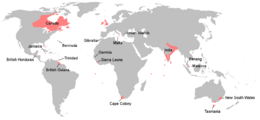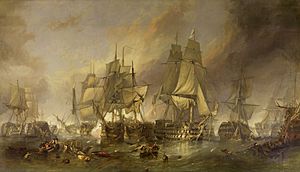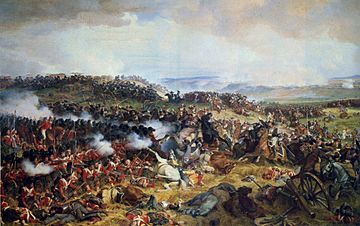United Kingdom in the Napoleonic Wars facts for kids
Between 1793 and 1815, under King George III, the Kingdom of Great Britain (which later became the United Kingdom) was a constant enemy of France. Britain played a key role in the defeat of Napoleon. It did this by controlling the seas, giving money to its allies in Europe, and sending its army to fight in the Peninsular War. Even as other major countries changed sides, Britain remained firm.
Contents
Britain Fights Napoleon's France
When King Louis XVI was executed in 1793, the French Revolution turned into a big fight between two ideas. On one side was conservative, royalist Britain and its friends. On the other side was radical, republican France. Napoleon took power in France in 1799. He threatened to invade Great Britain, which would have meant a similar fate to other European countries his armies had taken over.
Because of this threat, the British spent all their money and energy on the Napoleonic Wars. The Royal Navy blocked French ports, stopping their ships.
After a short break from 1801 to 1803, the war started again. Britain declared war on France, ending the peace treaty called the Treaty of Amiens. Napoleon's plans to invade Britain failed because his navy was not strong enough. In 1805, Lord Nelson's fleet completely defeated the French and Spanish navies at the Battle of Trafalgar. This was the last major sea battle of the Napoleonic Wars.
These sea battles and fights over colonies were similar to earlier wars. Conflicts in places like the Caribbean, where islands and bases were captured, could affect the war in Europe. The Napoleonic conflict became so widespread that historians later called it a "world war." Only the Seven Years' War before it had been on such a large scale.
Napoleon's Economic War Against Britain
Napoleon also tried to hurt Britain's economy. In 1806, he issued the Berlin Decree. This rule stopped European countries allied with or controlled by France from buying British goods. He set up the Continental System across Europe. All trade and even mail connections were supposed to be cut off.
However, British merchants smuggled many goods into Europe. The Continental System was not a very strong economic weapon. Britain did suffer some damage, especially in 1808 and 1811. But its control of the oceans helped reduce the harm. In fact, the economies of France and its allies suffered even more because they lost a useful trading partner. This made some governments angry and encouraged them to ignore Napoleon's system, which weakened his power.
The British army was much smaller than France's. At its peak, the British army had about 220,000 soldiers. France had an army of a million men, plus soldiers from its allies and hundreds of thousands of national guardsmen.
Even though the British army was smaller, the Royal Navy was very powerful. It stopped France's trade outside Europe by capturing French ships and taking French colonies. However, the navy could not stop France's trade with other European countries and posed little threat to French land in Europe. Also, France had a much larger population and could grow more food than Britain.
Many in the French government thought that cutting Britain off from Europe would end its economic power. But the Continental System never worked. Britain had the best factories in Europe. Its control of the seas allowed it to become very rich through trade with its growing new Empire. Britain's control of the sea meant France could never truly have peace to control Europe. France also could not threaten Britain's home islands or its main colonies.
Smaller conflicts, like the Gunboat War against Denmark or the Walcheren Campaign against the Netherlands, did not hurt Napoleon much. The War of 1812 against the United States also didn't stop him. But in 1808, the Spanish uprising of 1808 finally gave Britain a chance to gain a foothold in Europe.
The Duke of Wellington and his army, made up of British, Spanish, and Portuguese soldiers, slowly pushed the French out of Spain. In early 1814, while Napoleon was being pushed back in the east by the Prussians, Austrians, and Russians, Wellington invaded southern France. After Napoleon gave up and was sent away to the island of Elba, peace seemed to return. But when he escaped back to France in 1815, Britain and its allies had to fight him again. The armies of Wellington and Von Blucher finally defeated Napoleon for good at the Battle of Waterloo.
How Britain Paid for the War

A big reason for Britain's success was its ability to use its factories and money to defeat France. Britain had about 16 million people, which was less than half of France's 30 million. France had more soldiers, but Britain helped pay for many Austrian and Russian soldiers. In 1813, Britain paid for about 450,000 allied soldiers.
Most importantly, Britain's factories kept producing goods. Its well-organized businesses made sure the military got what it needed. Smuggling British goods into Europe also stopped France from ruining Britain's economy by cutting off markets.
In 1814, Britain's budget reached £66 million. This included £10 million for the Navy, £40 million for the Army, and £10 million for its allies. The country's national debt grew very large, reaching £679 million. This was more than double the country's total economic output (GDP). But hundreds of thousands of investors and taxpayers supported it, even with higher taxes on land and a new income tax. The total cost of the war was £831 million. In contrast, France's money system was not as good, and Napoleon's armies often had to take supplies from the lands they conquered.
See also
 | Chris Smalls |
 | Fred Hampton |
 | Ralph Abernathy |



